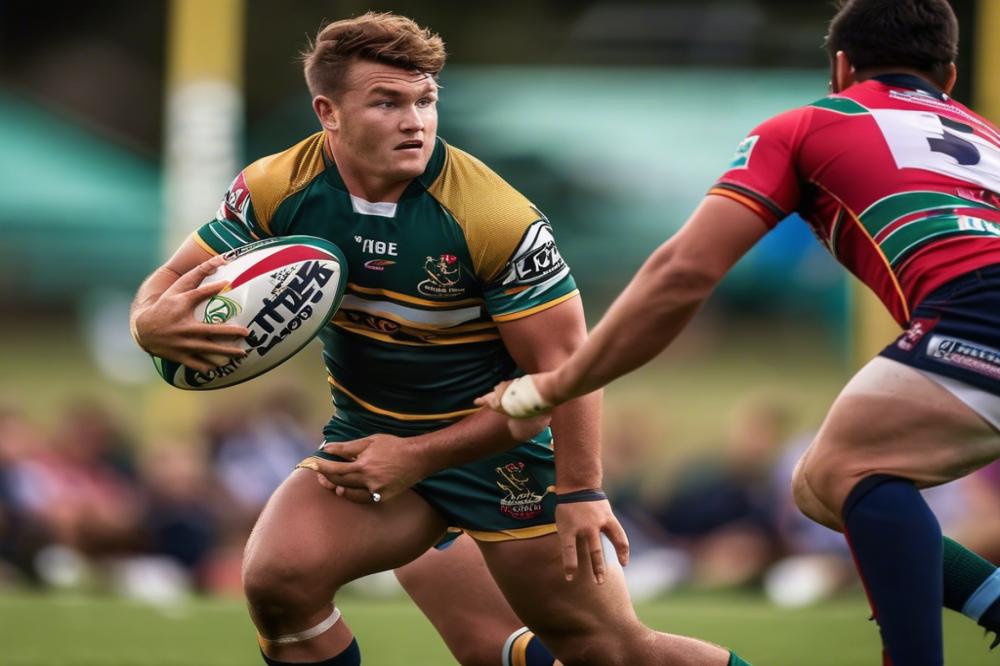Overview of NRL Rugby League player development & Pathways
National Rugby League (NRL) pathways are crucial for budding athletes. Young talents aspire to reach the top, but success doesn’t come overnight. Players often go through multiple stages before reaching the professional level. In fact, the journey involves a blend of skill improvement, athletic performance, and sports psychology.
From junior leagues to the professional arena, each step adds to the overall growth of these players. youth athletes receive coaching that aims to sharpen their talents. The NRL system includes diverse opportunities for aspirants to develop under skilled trainers. Learning through structured sports training forms the bedrock of future success.
Importance of reserve grade as a Key Phase in player development

The reserve grade serves as a vital link in this pathway. Simply put, athletes gain competitive experience by participating in this secondary level. It acts as a bridge, connecting raw talent to professional expertise. Here, players refine their skills while adapting to more strategic and fast-paced play.
Game time in the reserve league is often where talent progression accelerates. It provides the platform for testing new techniques learned during practice sessions. Moreover, it offers an environment where athletes can make mistakes and learn from them without the high stakes of premier leagues. This phase helps in fine-tuning athletic performance through continuous exposure.
Purpose of the Article, Focusing on the Impact of Reserve Grade on Player Advancement

This article aims to shed light on the effects of playing in the reserve grade. Specifically, we’re examining how this stage influences player development. Many overlook the significance of these secondary leagues, but they play a pivotal role in shaping future stars.
Expect insights into how participating at this level impacts coaching strategies and aids in skill refinement. We will explore real-life examples where competitive stints in the reserve grade prepared individuals for bigger challenges ahead. By examining these elements, readers can appreciate the intricate pathways leading to sports stardom. Understanding this crucial phase is important for grasping the full journey of an aspiring rugby league athlete.
Role of Reserve Grade in Player Development

Description and history of reserve grade within the NRL framework
The concept of reserve grade teams has long been a staple in the National Rugby League (NRL) framework. Historically, they served as a vital part of the league’s structure, offering teams a way to refine players outside the spotlight of the main stage. Over the years, this tier has acted as a proving ground. Athletes who start here face challenges similar to the top leagues. They receive valuable sports training, which is crucial for talent progression. Coaches employ sophisticated strategies to enhance player growth. The reserve teams offer necessary game time. Throughout its evolution, the system has remained central to developing quality players and enhancing athletic performance.
Comparison with other development pathways
Other sports rely on different developmental routes. Junior leagues and academies are popular alternatives. These routes serve as initiation points for youth athletes. In some sports, players jump from youth teams directly to the main leagues. That leap can lack the challenging environment needed for skill improvement. Reserve leagues provide an environment where competitive experience is gained. This stands in stark contrast to pathways lacking intermediate steps. In the NRL, reserve teams offer invaluable experience. Every match fine-tunes abilities. They give athletes space to experiment and grow. By contrast, academies might focus more heavily on foundational skills without immediate competitive pressure.
How reserve grade serves as a bridge between youth athletes and professional levels
Moving from youth teams to professional leagues isn’t easy. In rugby, this shift is supported by an intermediate stage. Reserve leagues function as a bridge, allowing young players to transition smoothly. Here, athletes benefit from increased game time and exposure. Coaches emphasize behavioral and physical development. This step ensures athletes are ready for the main leagues. Experience gained here shapes both skills and mentality. Players face real opponents, enhancing sports psychology understanding. Reserve squads test players under match-like conditions. This experience molds them, readying them for professional challenges.
Competitive Experience and Game Time
Playing in lower-tier leagues can be a game-changer for many young athletes, offering invaluable opportunities for skill improvement. In such environments, game time is vastly increased compared to sitting on the bench in top leagues. More time on the field can sharpen techniques. Practices become real actions. With each match, athletes learn to make quick decisions and adapt under pressure.
Gaining competitive experience is crucial. It plays a vital role in athletic performance. These matches present real-world action and stress, unlike what is often faced in training. Such severity helps refine strategies and mental toughness in sports psychology. It’s in these settings that player growth is fostered, where they learn to handle winning and losing in a mature way. This process is part of talent progression. Athletes learn, adjust, and evolve through frequent participation. They absorb lessons only compete can teach.
Numerous athletes have successfully transitioned from lower leagues to professional levels. Take the story of John McCarthy, who spent three years in second-tier leagues before his debut in the premier division. His accumulated competitive experience and understanding of game dynamics earned him a quick reputation on the big stage. Another example is Maria Gonzales, who thanks to increased responsibility and game time, gained confidence to join the professional ranks. Coaching strategies that focus on reserve leagues help bridge this gap, promoting player development effectively.
Skills and Talent Progression
Playing in reserve grade offers invaluable opportunities to athletes wanting to hone their athletic skills. It allows players to fine-tune movements through repetitive game time and real-match situations. Sporting activities within this environment provide a platform where youth athletes can practice sports training in a less intense setting before stepping onto the bigger stages.
In reserve matches, unpredictable scenarios often arise, challenging players to adapt under pressure. Encountering high-pressure moments regularly helps in enhancing skills, not just physically but mentally as well. Coaches often emphasize the importance of such experiences as they directly contribute to athletic performance during official competitions.
Youth athletes can show exceptional talent progression by building confidence through repeated exposure to competitive experience. Identifying potential future stars is an ongoing process for scouts and coaches. Each game presents youth opportunities to shine and stand out, offering glimpses into their abilities and future potential.
Reserve matches provide a myriad of coaching strategies that focus on skill improvement. Mentors utilize sports psychology to motivate athletes, ensuring they focus on their growth and overcoming challenges. Opportunity by opportunity, the athlete learns to transcend their current limits.
Coaching Strategies and Athlete Growth
Effective Coaching Strategies Tailored for Reserve Grade Players
For reserve grade athletes, having the right coaching strategies is pivotal. Coaches must design practices that focus on skill improvement and mental readiness. Young athletes need guidance that hones in on both physical and mental aspects. Routines should challenge the players, pushing them to adapt and learn. Understanding each player’s strengths and weaknesses allows for more effective training. Critical thinking on the field can develop when athletes are taught to make quick decisions. Encouraging this mindset prepares them for the main stage. Coaches that combine technical drills with real-life scenarios tap into deeper learning. It’s about finding balance.
Importance of Individualized Training Programs in Sports Training
A one-size-fits-all approach lacks in developing athletes. Each young athlete has unique needs and potentials. Individualized training programs cater specifically to different skill sets. With personalized plans, athletes gain competitive experience that’s relevant. Every athlete progresses at their own pace, needing attention to detail. These tailored programs enhance athletic performance by honing specific abilities. Addressing personal goals, while emphasizing broad team strategies, leads to optimized training outcomes. It allows athletes to see tangible growth and talent progression.
How Coaching Can Influence Athlete Growth and Development
Effective coaching can transform athlete growth significantly. Coaches have the power to shape an athlete’s career trajectory. By focusing on both physical conditioning and sports psychology, coaches inspire confidence in their players. There is a direct link between well-structured coaching and improved game time performance. Positive reinforcement fuels motivation, driving exploration of new techniques. The coach-athlete relationship is fundamental; a supportive environment encourages open communication. When players feel understood and valued, their potential for development skyrockets. Ultimately, a coach’s influence extends beyond techniques, impacting every facet of a player’s journey.
Role of Sports Psychology in Reserve Grade
Psychological challenges of playing in reserve grade and their impact
Life in reserve grade can be tough. Athletes often face unique psychological challenges. This impacts their confidence and self-esteem. Competition for main team placements results in immense pressure. They struggle to maintain motivation when not part of the primary squad. Limited game time leads to frustration. This situation can affect athletic performance negatively.
Athletes may also battle feelings of isolation. Sitting on the sidelines tests their resilience. When progression appears stalled, doubts creep in. The impact on talent progression can be significant. Thus, understanding sports psychology becomes crucial.
Techniques to enhance mental toughness and resilience
Mental toughness is vital for athletic growth. To foster resilience, athletes need specific strategies. Visualization techniques can help. Imagining success builds a positive mindset. Additionally, goal-setting encourages focus.
Youth athletes benefit from mindfulness practices. These exercises reduce stress. They also prepare them for challenging scenarios. Support from coaching staff enhances skill improvement. Coaches should teach strategies that empower athletes mentally. Positive reinforcement plays a significant role here.
Encouraging self-talk is another technique. It aids in building an athlete’s confidence. Facing adversity with optimism develops grit. Over time, these efforts lead to better results in sports training.
How sports psychology supports long-term development
Sports psychology contributes significantly to long-term development. It nurtures the mental framework required for athletic success. Beyond immediate gains, it focuses on lasting growth.
Developing emotional intelligence adds another layer. Athletes learn to regulate emotions during competition. Emotional balance enhances overall performance.
Incorporating psychological strategies into training becomes essential. This approach complements traditional coaching strategies. Athletes learn to adapt to various stressors. Such adaptability is crucial for competitive experience. Emphasis on mental skills complements physical training.
Athletes gain confidence that extends beyond the game. Enhanced resilience leads to improvement in various life aspects. Integrating these practices early ensures sustained success in their careers. Ultimately, sports psychology fortifies the foundations of future achievements.
Advancement Through Reserve Grades
The significance of reserve grade in the pathway to professional rugby league cannot be overstated. Aspiring players often find this stage crucial for building skills that aren’t honed elsewhere. For many, it stands as the bridge between amateur and professional play.
Players see great improvement from this competition level. It offers a real-world playing environment where they can learn at their own pace. Here, youth athletes test their resilience and broaden their understanding of the game. Playing alongside various talents, they learn teamwork and adaptability. These experiences are invaluable.
To optimize these experiences, leagues must focus on supportive coaching. Mental development should be as emphasized as the physical. Coaches play a pivotal role in shaping attitudes. Providing regular feedback ensures players can progress efficiently. Access to proper facilities also aids in honing sports training routines.
In conclusion, the reserve grade remains a key component in player growth. Balancing competitive pressure with learning opportunities benefits all involved. As stakeholders, everyone should work together to enhance these environments. In doing so, the next generation of talented athletes will thrive.



